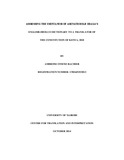| dc.description.abstract | We set out to assess the usefulness of the English-Dholuo Dictionary by Asenath Bole Odaga, to a translator of the Constitution of Kenya, 2010. Our concern was with the indisputable need to disseminate the Constitution to Kenyans in general and to the Luo speaking citizens of Kenya in particular. This concern arose out of the published levels of literacy in Kenya which put the figure of those who are illiterate in one way or another at 35% (KNBS, 2009). The problem that we set out to address was how to disseminate the Constitution of Kenya 2010 to a target population that was largely illiterate. We considered the fact that the constitution in question is published by the government in English and Kiswahili only with the result that it remains incomprehensible to the illiterate population thus posing a challenge to dissemination. This inevitably led us to consider translating the Constitution into indigenous languages which in turn brought into focus the need for translation tools such as dictionaries. We chose Dholuo as a sample of an indigenous language hence the Luo as a target audience and the English Dholuo Dictionary by Asenath Odaga as a translation tool for evaluation. In conducting the study, we identified 150 key words in the Constitution and perused the Dictionary under assessment in search of equivalent words that would be used by a translator of the Constitution to render the meaning of the key words identified into the target language namely, Dholuo. We proceeded on the major hypothesis that the dictionary under review or assessment was useful and adequate as a tool in translating the Constitution of Kenya 2010 into Dholuo. Our theoretical framework was an eclectic one combining the concepts of lexical equivalence, terminology development and translation in specialised fields which in this case is the legal field. We identified key words on the basis of the theme of a given chapter of the Constitution focusing on the words whose translatability would be crucial in conveying the spirit, the thrust and the meaning of the chapter of the Constitution. Where we were unable to find in the dictionary words equivalent to the key words identified or where the key words identified were missing from the lexical entries in the dictionaries we attempted a translation of the key words using other techniques usually employed in translation in such circumstances including terminology development. We were able to measure the outcome by taking account of the number of the identified key words against the number of those words that we were able to translate using the English-Dholuo Dictionary. Our finding was that out of the 150 keywords that we identified, only 45 key words had been entered into the English-Dholuo Dictionary by Odaga representing a paltry 30% of the words sampled. The remaining 105 words had not been entered into the dictionary and for this reason could not be translated by use of the dictionary under evaluation. The inescapable conclusion was this dictionary was inadequate as a tool in translating the Constitution of Kenya 2010. | en_US |

